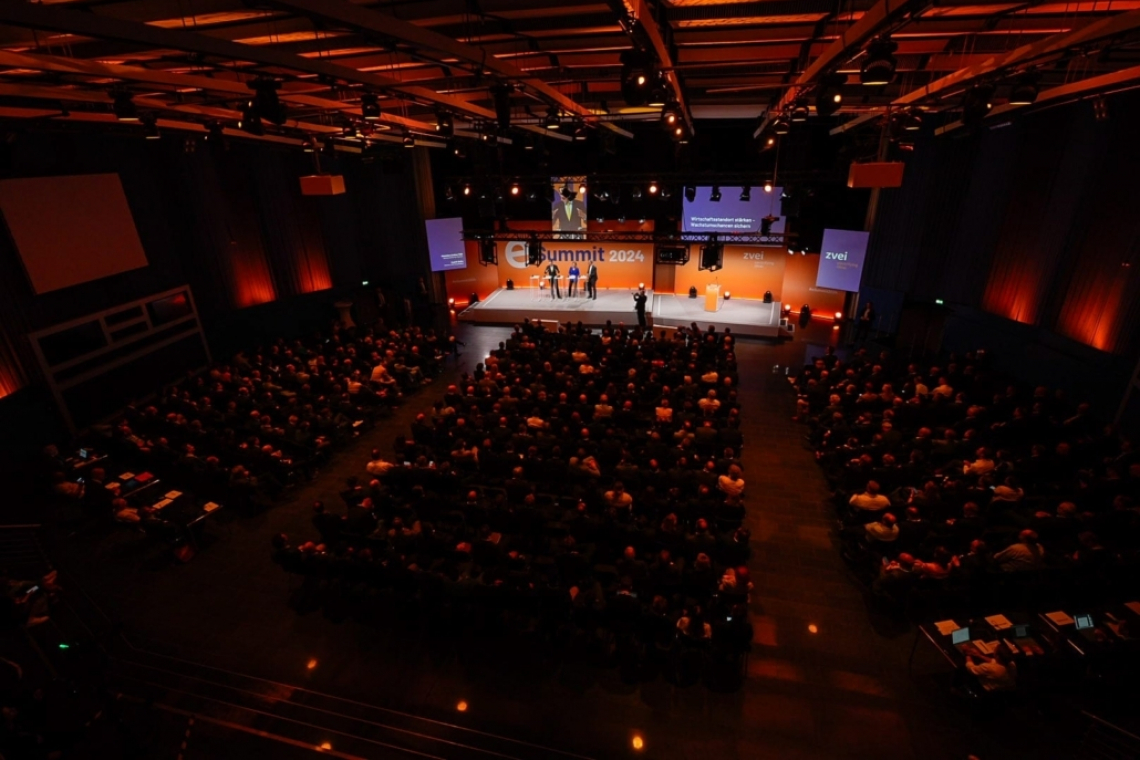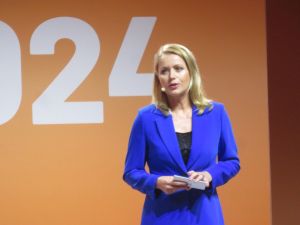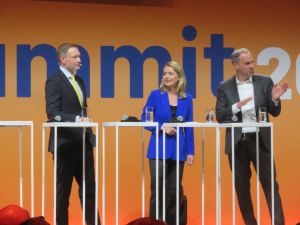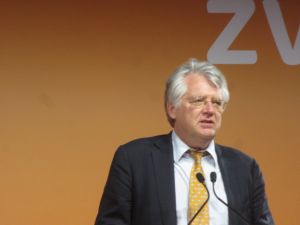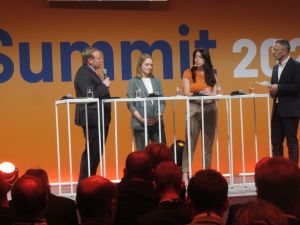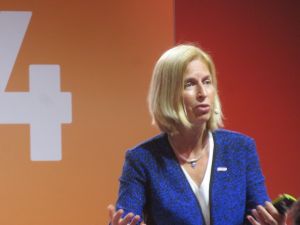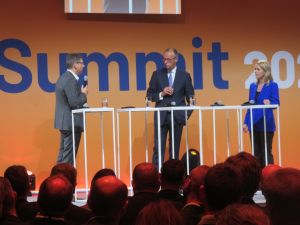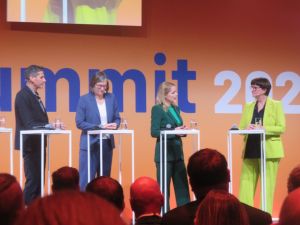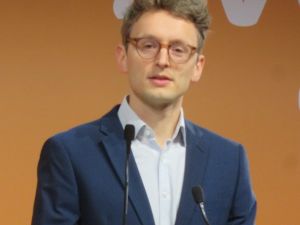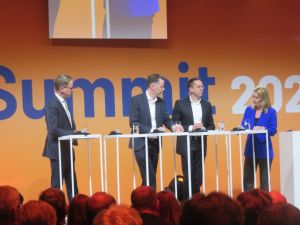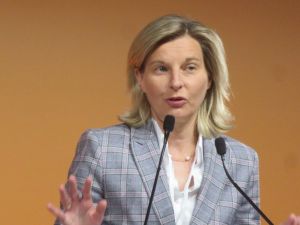The eSummit 2024 offered ideas and discussions on implementing the energy transition. Top politicians and decision-makers from the electrical and digital industry also debated topics such as strengthening the business location, future work skills and green electronics. The ZVEI event at Kosmos Berlin attracted over 500 participants, who were more than satisfied.
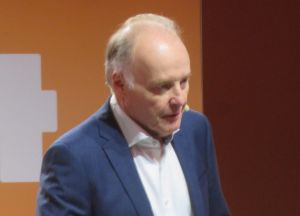 ZVEI President Dr. Gunther Kegel during the keynote speechZVEI PresidentDr. Gunther Kegel opened the eSummit with the words: "We need a turnaround in efficiency, now!" and met with great approval from the attendees. In his keynote speech 'The future is electric', he explained why something has to happen now. The first wave of electrification started 120 years ago with electricity generation in power plants. Now comes the second wave of electrification based on renewable energies, which will eventually be available in abundance and can then also be stored and used in molecular form, e.g. as hydrogen or eFuel. The second wave of electrification is turning things upside down. Centralized energy generation is becoming decentralized, and new technologies for the heating sector and mobility are required. There are many good ideas and solutions for this. The ZVEI is convinced that electrification is a huge opportunity for the industry, for Germany and for Europe if it is given a clearer political shape. The political confusion surrounding the Heating Act, the promotion of charging points, the high-voltage grid, etc. has led to a situation in the middle of society where the opportunities are not seen, but uncertainty prevails. The energy transition is, among other things, an energy efficiency transition - this also applies politically. Because, as he said: "Far too often we stand in our own way. We can no longer afford our wasteful inefficiency - we need a turnaround in efficiency."
ZVEI President Dr. Gunther Kegel during the keynote speechZVEI PresidentDr. Gunther Kegel opened the eSummit with the words: "We need a turnaround in efficiency, now!" and met with great approval from the attendees. In his keynote speech 'The future is electric', he explained why something has to happen now. The first wave of electrification started 120 years ago with electricity generation in power plants. Now comes the second wave of electrification based on renewable energies, which will eventually be available in abundance and can then also be stored and used in molecular form, e.g. as hydrogen or eFuel. The second wave of electrification is turning things upside down. Centralized energy generation is becoming decentralized, and new technologies for the heating sector and mobility are required. There are many good ideas and solutions for this. The ZVEI is convinced that electrification is a huge opportunity for the industry, for Germany and for Europe if it is given a clearer political shape. The political confusion surrounding the Heating Act, the promotion of charging points, the high-voltage grid, etc. has led to a situation in the middle of society where the opportunities are not seen, but uncertainty prevails. The energy transition is, among other things, an energy efficiency transition - this also applies politically. Because, as he said: "Far too often we stand in our own way. We can no longer afford our wasteful inefficiency - we need a turnaround in efficiency."
Strengthening the business location - securing growth opportunities
Christian Lindner MdB, Federal Minister of Finance, and Cedrik Neike, Member of the Executive Board of Siemens AG and ZVEI Vice President, discussed what could contribute to this in short keynote speeches and a subsequent discussion. Christian Lindner said, among other things, that the task was to unleash the spirit of invention and: "We should strive forward again and not be modest with what we have." The LNG terminal speed is the benchmark. "Quo vadis, German industry?" asked Cedrik Neike in view of the low growth rate of 0.7% and cited further data before discussing industrial AI as an important factor for the future. He said: "AI must be suitable for industry. AI must be accessible to all of us. AI needs strong ecosystems. We need to tackle it together."
More European self-confidence: This is how we assert ourselves in global politics
In his keynote speech, Jörg Wuttke, former President of the EU Chamber of Commerce in Beijing, addressed the situation by citing data on China. For example, China has enormous production capacities in many areas (over 60% of the world for some products) and high global market shares (e.g. 36% of manufacturing production), but low domestic consumption of only 10%, which leads to overcapacity and imbalances in trade. For every four containers coming from China, only one is returned. In addition, the population is shrinking due to fewer young people and children in rural areas are being neglected when it comes to schooling, which has an impact on their later working life and the economy. He recommended continuing to work with China and learning how to deal with China's increasing self-sufficiency and, above all, "beating China in third markets".
Side events on the first day
The lunch break was followed by three parallel, interactive sessions that went into great detail:
- Session 1: 'Technical solutions for sector-coupling systems as the basis for a successful energy transition (...and the production of tomorrow?)' moderated by Dr. Chris-Jörg Rosen, Vice President Manufacturing Solutions, Phoenix Contact.
- Session 2: 'Seeing decarbonization as an opportunity' moderated by Andreas Cordes, Business Development Manager, and Mathias Christ, Technical Sales Manager, Endress+Hauser, who showed how the data required for ESG reporting can be collected automatically.
- Session 3: '#ElectrifyingStandards - simply making the energy transition faster' moderated by Raphael Görner, Executive Vice President Business Unit Energy & Power Solutions, Rittal.
Turning Europe into a continent of opportunity
Ministerial Director Dr. Kirsten Scholl, Head of the European Policy Department at the Federal Ministry for Economic Affairs and Climate Protection, and Daniel Hager, Chairman of the Supervisory Board and shareholder of Hager, Frank Stührenberg, CEO of Phoenix Contact and ZVEI Vice President, discussed the topic: "More entrepreneurship, less bureaucracy: Europe can do more". The 88-page General Data Protection Regulation (GDPR) served as an example to illustrate this. Frank Stührenberg commented: "It does not fulfill its purpose." The regulation should be changed or withdrawn.
Tilman Kuban MdB, CDU parliamentary group, Ria Schröder MdB, FDP parliamentary group, and Melis Sekmen MdB, Bündnis 90/Die Grünen parliamentary group, then discussed 'Next Generation Europe: How we strengthen Europe', moderated by Philipp Steinberger, CEO of Wöhner. They explained what opportunities they see in the digital transformation. Young people can be inspired by insights. It is important to make it simple and put the economy first.
Think global, think strategic: this is how Europe remains technologically sovereign
Dr. Tanja Rückert, Member of the Board of Management, Robert Bosch, emphasized in her keynote speech: "Artificial intelligence and semiconductors are topics that Europe should focus on." The focus is always on the customer. They want sustainability, safety and convenience. Bosch implements these through data, digitalization and AI. AI is used in the products and in their manufacture. Bosch produces MEMS in Reutlingen and SiC semiconductors in a fully digitalized factory in Dresden. Christoph Schell, CCO of Intel, Dr. Tanja Rückert, Torsten Reitze, CFO of Zeiss Semiconductor Manufacturing Technology Segment, and Dr. Reiner Haseloff, Minister President of Saxony-Anhalt, discussed how Europe can remain technologically sovereign. Among other things, they discussed the funding programs for the semiconductor and battery sectors, which need to be expanded and made permanent.
A changing world - shaping trade policy
Friedrich Merz MdB, Chairman of the CDU Germany, gave a statement on shaping trade policy in a changing world in which new trade agreements are becoming more important and more difficult. Pure trade agreements without regulations on environmental protection, worker protection, etc. are in demand. The subsequent discussion focused on the current stagnation and uncertainty, among other things. Volker Bibelhausen, Spokesman of the Executive Board and Chief Technology Officer, Weidmüller, stated: "Europe must do more itself for security and freedom, regardless of who is the next president."
Presentation of the Electrifying Ideas Award
After an introduction by Dr. Gunther Kegel, Dr. Robert Habeck MdB, Vice Chancellor and Federal Minister for Economic Affairs and Climate Protection, took to the stage for the keynote speech and award ceremony. "It's really cool to be at the ZVEI," he said, before addressing the current situation in his keynote speech. Waiting is wrong when there is great momentum. Others have invested in the last two years. We need to create a market environment so that our strength can be exploited. The separation of R&D from dual use is no longer in keeping with the times. Dr. Robert Habeck encouraged us to take action with his "Go!" appeal. Otherwise, the turnaround is just talk. We must become capable of security and maintain our freedom. When it comes to AIAct, it is important to pay attention to what makes sense and that no sticks are thrown in front of our legs. Dr. Robert Habeck then presented the Electrifying Ideas Award 2024 to the winners. The winners had been selected by an independent jury of top-class experts from business, research, politics and society from over 50 submissions (10 of which were from newcomers). In the 'Established Companies' category, MTM Ruhrzinn won with a project for the environmentally friendly chemical purification of metal paste waste, in particular solder pastes containing tin. These are produced during various processes, particularly in the electronics industry. "By recycling valuable metals, the project conserves resources, reduces the environmental impact and supports the sustainability and competitiveness of the industry in the long term," said MTM Managing Director Dan Mutschler. "Expressed in figures: solder paste made from primary tin produces 38.5 kgof CO2 equivalents, while our new process only produces 3.3 kg." Smart home solutions can help to make homes more energy-efficient, more comfortable and safer. However, in most buildings, electrical systems are still predominantly installed conventionally - which is often due to their complexity. The company Captica wants to change this - with a tool set consisting of hardware and software for the electrical trade. The system supports the entire process of installing intelligent building technology, for example through AI-based fault monitoring or efficiency optimization. "Electricians on site make the difference. They help decide how smart the home of the future will be," said Captica CEO Elmar Loth. "With digital support, they will master the increasing complexity of smart building technology with flying colors," added Head of Marketing Ulrike Böhm.
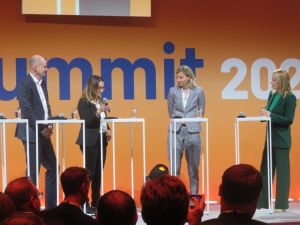 Tim Oliver Holt, Member of the Executive Board of Siemens Energy, Dr. Barbara Frei, Executive Vice President Industrial Automation at Schneider Electric, and Barbie Haller at the panel discussion on the transformation of the energy system
Tim Oliver Holt, Member of the Executive Board of Siemens Energy, Dr. Barbara Frei, Executive Vice President Industrial Automation at Schneider Electric, and Barbie Haller at the panel discussion on the transformation of the energy system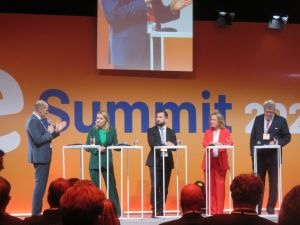 Markus Aschenbrenner, Member of the Management Board of Zollner Elektronik AG, moderator Astrid Frohloff, Dan Mutschler, CEO of MTM Ruhrzinn GmbH, Steffi Lemke MdB, Federal Minister for the Environment, Nature Conservation, Nuclear Safety and Consumer Protection, and Dr. Reinhard Zinkann discussed Green Elctronics
Markus Aschenbrenner, Member of the Management Board of Zollner Elektronik AG, moderator Astrid Frohloff, Dan Mutschler, CEO of MTM Ruhrzinn GmbH, Steffi Lemke MdB, Federal Minister for the Environment, Nature Conservation, Nuclear Safety and Consumer Protection, and Dr. Reinhard Zinkann discussed Green ElctronicsSide events on the first day
The second day of the conference started with four parallel, in-depth interactive sessions:
- Session 1: 'Ignite Electricity 4.0 + Digitalization for sustainable and resilient growth of the German Industry' moderated by Jessica Bethune, Vice President Industrial & Process Automation, DACH, Schneider Electric
- Session 2: 'Harting Connectivity AI - how artificial intelligence enables the generative design of application-oriented connectivity development' moderated by Norbert Gemmeke, Managing Director, Harting Electric Foundation
- Session 3: 'Myths surrounding electromobility' moderated by Thomas Nindl, Chief Operating Officer, Brusa Elektronik, who listed and refuted them. For example, the ecological balance of EVs is said to be worse. However, several studies show that EVs are significantly better even with the current European electricity mix.
- Session 4: 'Software Defines Everything: Why? What? How?' moderated by Florian Harzenetter, Sen. Director & Global Industry Advisor Industrial, PTC & Matthias Klocke, Director IT Product Lifecycle Management (PLM), Miele
We got the Power: How to successfully transform the energy system
Dr. Anselm Eicke, Consultant at Neon Neue Energieökonomik, presented the results of a study for the ZVEI. Switching to e-vehicles and heat pumps with storage has a savings potential of 20 % - 70 % (of costs). Added to this is the added value of decentralized flexibility for the market and the energy grid. Accordingly, the introduction of dynamic tariffs was recommended for regulation and market design.
Barbie Haller, Vice President of the Federal Network Agency, said that we are only at the beginning of the energy transition. The speed and the associated challenges are not yet clear. For example, 18,000 km of high-voltage lines need to be built and grid status monitoring urgently needs to be expanded, as smart grids are a must.
Future Work Skills: The world of work in the digital transformation
An important prerequisite for a successful digital transformation is to make employees aware that digitalization must serve people and not the other way around. To achieve this, the digital transformation must be exemplified by management, who must use the same tools.
Green electronics: how to make the circular economy a success
Dr. Reinhard Zinkann, Managing Partner of Miele, began by saying that the ZVEI has reached the political arena in Berlin and that the circular economy requires new business models. Because only green products have a future. The work for a digital product passport, in which all environmentally relevant product data is recorded, has been started by the ZVEI. Digitalization is the basis for the circular economy, which not only makes ecological sense, but also economic sense, especially in terms of Scope 3.
Shaping the future together with innovations
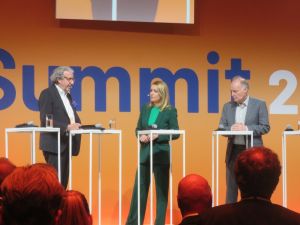 Stefan Wolf, President of Gesamtmetall, moderator Astrid Frohloff and ZVEI President Dr. Gunther Kegel at the closing discussionTheclosing discussion highlighted what needs to be done for the future. Dr. Gunther Kegel began by emphasizing that electricity from renewable energies will be the energy source of the future. To this end, storage capacities and efficiency must be increased. The basis for this is further electrification, automation and digitalization. A turnaround in regulatory and framework conditions is also necessary. Wolfgang Weber, Chairman of the ZVEI Management Board, added that over 50% of companies rate their own electrification targets as high and want to invest further in electrification. The main obstacles are long planning and approval procedures. Three quarters of companies also have their own climate protection targets. More favorable electricity prices and possibly higherCO2 prices would be attractive. Dr. Stefan Wolf, President of Gesamtmetall | Gesamtverband der Arbeitgeberverbände der Metall- und Elektro-Industrie, agreed. Investments in modern equipment and no deindustrialization are the solution for the future. Performance must be rewarded and bureaucracy reduced. In addition, the pool of skilled workers must be used, e.g. through better daycare facilities. In general, there is confidence for the future, as good conditions are in place. However, a "battle of the houses", as Dr. Gunther Kegel put it, is necessary in order to gradually change or eliminate inappropriate guidelines (parts). Dr. Gunther Kegel concluded by thanking everyone and asking for further support, particularly with regard to the guidelines.
Stefan Wolf, President of Gesamtmetall, moderator Astrid Frohloff and ZVEI President Dr. Gunther Kegel at the closing discussionTheclosing discussion highlighted what needs to be done for the future. Dr. Gunther Kegel began by emphasizing that electricity from renewable energies will be the energy source of the future. To this end, storage capacities and efficiency must be increased. The basis for this is further electrification, automation and digitalization. A turnaround in regulatory and framework conditions is also necessary. Wolfgang Weber, Chairman of the ZVEI Management Board, added that over 50% of companies rate their own electrification targets as high and want to invest further in electrification. The main obstacles are long planning and approval procedures. Three quarters of companies also have their own climate protection targets. More favorable electricity prices and possibly higherCO2 prices would be attractive. Dr. Stefan Wolf, President of Gesamtmetall | Gesamtverband der Arbeitgeberverbände der Metall- und Elektro-Industrie, agreed. Investments in modern equipment and no deindustrialization are the solution for the future. Performance must be rewarded and bureaucracy reduced. In addition, the pool of skilled workers must be used, e.g. through better daycare facilities. In general, there is confidence for the future, as good conditions are in place. However, a "battle of the houses", as Dr. Gunther Kegel put it, is necessary in order to gradually change or eliminate inappropriate guidelines (parts). Dr. Gunther Kegel concluded by thanking everyone and asking for further support, particularly with regard to the guidelines.
The two days at Kosmos Berlin were exciting, inspiring and entertaining. At eSummit 2024, it became clear once again: the future is electric!
The next eSummit will take place in Berlin on May 22 and 23, 2025.




